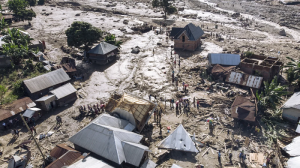Researchers from the World Weather Attribution group were unable to confidently assess the role of climate change in the May 2023 heavy rainfall that led to deadly floods in Rwanda and the Democratic Republic of Congo (DRC) due to a lack of weather station data and the inability of climate models to simulate the event.

The result reflects the fact that a lack of investment in research may hinder efforts to understand and adapt to climate risks in the region and to identify losses and damages caused by climate change.
In early May, severe rainfall led to flooding and hundreds of landslides around Lake Kivu, on the border between Rwanda and the DRC. During the event, Rwanda broke its maximum daily rainfall record, with 182.6 mm of rainfall. Nearly 600 people died across the countries, with 135 fatalities reported in Rwanda and 460 reported in the DRC.
The area around Lake Kivu is one of the most densely populated regions in Africa. The region is also home to important mineral reserves, which are critical for the global transition to replace fossil fuels with renewable energies. Deforestation for agriculture and mining has greatly increased the risk of landslides and many settlements are located in highly vulnerable areas.
To assess the effect of climate change on the heavy rain, scientists tried to analyse weather data and use computer model simulations to compare the climate as it is today, after about 1.2°C of global warming since the late 1800s, with the climate of the past, following peer-reviewed methods. This approach was successfully used in other extreme event attribution studies on heavy rainfall events, such as the 2021 western Europe and 2022 Pakistan floods.
While the Intergovernmental Panel on Climate Change (IPCC) projects there will be increased heavy rain in the region, the scientists were unable to evaluate the contribution of climate change to the May floods. The absence of accessible, long-term and reliable meteorological data, as well as poor climate model performance in the region, meant the scientists could not confidently determine how human-caused climate change influenced the intensity and likelihood of the extreme rainfall.
Significant investment in weather monitoring stations and climate science, as well as improved access to existing data, is needed to understand changing weather extremes in central Africa. These actions will also help improve early warning to future heavy rainfall events and improve global climate models.
The potential for even heavier rainfall, as projected with continued greenhouse gas emissions, highlights the urgent need for more resilience to flooding and landslides in Rwanda and the DRC.
Of the more than 50 World Weather Attribution studies to date, just three other studies have had inconclusive results, with two of these studies also focused on countries in Africa – the 2015 Ethiopia and 2022 Central Sahel droughts.
The study was conducted by 17 researchers as part of the World Weather Attribution group, including scientists from universities and meteorological agencies in Rwanda, the Democratic Republic of Congo, Belgium, Germany, the Netherlands, the United Kingdom and the US.
Dieudonne Nsadisa Faka, Team Leader of the intra-ACP Climate Services Programme of The Organisation of African, Caribbean and Pacific States, Brussels, Belgium, said: “We know the rainfall around Lake Kivu was extreme, in terms of the destructive impacts it triggered. However, due to incomplete and inaccessible meteorological records, we don’t know how to qualify it as an extreme event.
“In Rwanda and the DRC, paper-based observational records need digitising, weather stations destroyed during conflict need rebuilding and meteorological agencies need proper funding to enable them to more freely share their data.
“These efforts combined will improve climate science and our understanding of climate change impacts in central Africa.”
Joyce Kimutai, Research Associate in the Analysis and Interpretation of Climate, Grantham Institute for Climate Change and the Environment, Imperial College London, said: “Climate models struggle to accurately simulate heavy rainfall and other weather extremes in most regions of equatorial Africa and especially in central Africa. Poor model performance was one factor that prevented us from completing an attribution analysis on the Lake Kivu extreme rainfall that led to the floods.
“Increased investment in climate science and weather observations will help improve the performance of climate models in central Africa, which will help communities and governments anticipate and adapt to changing weather extremes.”
Friederike Otto, Senior Lecturer in Climate Science at the Grantham Institute for Climate Change and the Environment, Imperial College London, said: “The African continent has contributed the least to global greenhouse gas emissions, but suffers severe losses and damages due to the impacts of climate change hitting vulnerable populations. Many of these losses are poorly understood.
“Unless fossil fuels are rapidly phased out, heavy downpours will continue to become more severe around the world, including in many regions of Africa. Without substantial climate finance going towards Africa and long-term investments in capacity and resilience building, these losses will continue to dramatically increase.”
Leonard Nioulé, International Federation of Red Cross and Red Crescent Societies, Kinshasa, DR Congo, said: “A range of factors including conflict, poverty and deforestation greatly worsened the impacts of the flooding. The death toll was extreme for a rainfall event in any part of the world and the potential for increased heavy rainfall in the region is incredibly concerning.”
